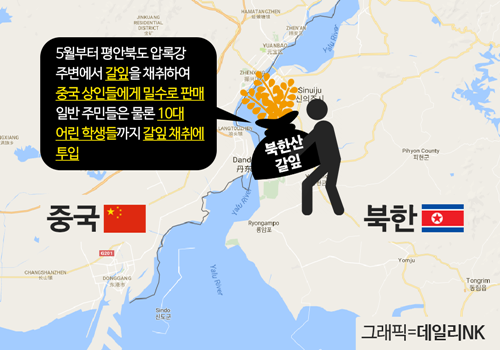Despite strong international sanctions against North Korea, the area around the Amnok (Yalu) River separating China’s Liaoning Province Dandong City from North Korea’s North Pyongan Province is rife with smuggling activity. Trading companies are taking the lead in earning foreign currency with the tacit consent of border guards, who receive bribes in return.
Since May last year, many North Koreans have been involved in harvesting and selling reeds that grow near the Amnok River in North Pyongan Province to Chinese merchants. Reeds are becoming increasingly popular in China as a health food, and are primarily exported to China by smuggling. To harvest the reeds, ordinary residents and even teenagers have been sent to the area.
“Even young children are out there picking reeds from the early morning hours. It was also smuggled last year, but the volume has picked up recently in response to increasing Chinese demand. It has expanded into new markets in China, reaching as far as the country’s southern regions,” said a North Pyongan source in a recent phone call with Daily NK.
“From the point of view of the North Korean trading companies, there’s no reason to turn down the offers from Chinese merchants. The trading companies mobilize residents to collect the leaves and pay them for their contributions. It’s a money-maker for all involved.”
North Korean border guards in the region have also joined in on the action. According to the source, residents are not ordinarily permitted to enter the state-owned reed fields. But the guards accept a bribe of approximately 100 yuan per resident to allow them to come and go freely from the fields for a period of one month.
For their hard work, the residents receive a small share of the profits, while the trading companies take the lion’s share. This model follows a pattern that has long existed in North Korea.
“The reeds sell in the Chinese markets for 2 yuan per kilogram, but the North Korean residents collecting them are paid only 0.6 yuan per kilogram. That means that a very diligent worker can wake up early and pick reeds all day long to accumulate a total of 20 kilograms. That is enough to buy 2 kilograms or rice,” said a separate source in North Pyongan Province.
“But after paying the bribes to the border guards, there isn’t that much money left over.”
International sanctions have limited the quantity and variety of products traveling through customs in China’s Dandong City. More products will likely be added to the restricted items list in the near future.





















